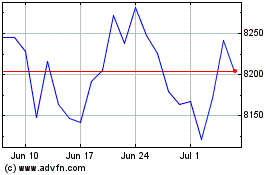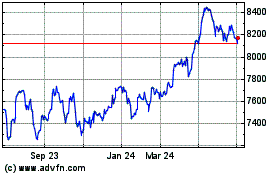By Riva Gold
Stocks and bond yields pared losses, the British pound charged
back from a 31-year low and the dollar came under pressure Tuesday
as investors parsed comments from U.K. Prime Minister Theresa May
and President-elect Donald Trump.
Futures pointed to a 0.4% opening loss for the S&P 500
despite a 0.9% drop in the dollar as U.S. markets were set to
reopen from the Martin Luther King Day holiday and catch up with
Monday's declines in Europe and Asia.
"Market participants are really trading political tone," said
Stephen Gallo, strategist at BMO Capital Markets.
In a closely watched speech in midday in London, Mrs. May
outlined her plans to take the U.K. out of the European Union,
confirming media reports published over the weekend that the U.K.
wouldn't seek membership in the EU's single market.
While that stance is perceived by many investors as negative for
the U.K. currency and U.K. assets, the British pound rose 2.4% to
$1.2332 after her speech, in which she also said the government
would put a final Brexit deal to vote in both houses of U.K.
parliament.
The Stoxx Europe 600 reversed morning losses to trade flat after
concerns around Mrs. May's speech sent the index to its biggest
daily fall since November on Monday.
Market participants had already widely expected Mrs. May to
prioritize control over immigration over its trading relationship
with the bloc following weekend media reports that punished the
pound and weighed on global stock markets ahead of the speech.
"The most negative aspects of her speech were already out there,
and everything else was pretty levelheaded in tone," said Mr.
Gallo.
Sterling was also bolstered by data showing U.K. inflation hit a
two-year high in December and comments late Monday from Bank of
England Gov. Mark Carney that officials are prepared to raise
interest rates if price-growth looks set to stay persistently above
their annual target.
The moves also came as the WSJ Dollar Index, which tracks the
dollar against a basket of 16 currencies, fell 0.9%. The euro was
up 0.7% against the dollar at $1.0686, while the dollar was down
0.4% against the yen at Yen113.5430.
In his interview with The Wall Street Journal on Friday,
President-elect Donald Trump criticized a cornerstone of House
Republicans' corporate-tax plan and said the U.S. dollar was
already "too strong" in part because China holds down its currency,
the yuan.
Some analysts also attributed the move in the dollar to
nervousness just days ahead of the presidential inauguration,
following steep gains after the November election driven by
expectations the new administration would help boost growth and
inflation.
"A lack of form for Brexit and for Trump's fiscal policies
presently exist, and the market is demanding clarity," said Jane
Foley, currency strategist at Dutch lender Rabobank. "Whilst the
rally in the dollar into the end of last year was built on hope of
reflation, a rally can't sustain on rhetoric alone," she said.
In stock markets, London FTSE 100 index fell 0.9% as the climb
in the pound pressured shares of exporters. The index had snapped
its longest-ever winning streak on Monday amid concerns an exit
from the single market would hurt U.K. companies.
In U.S. premarket trading, shares of Morgan Stanley added 0.1%
after the bank beat analyst expectations as it logged its strongest
fourth-quarter profit since the financial crisis. Financial shares
rose Friday at the start of banks' earnings season, helping
rekindle a stalled postelection rally in the sector.
Shares of Reynolds American gained 3.9% premarket, while shares
of British American Tobacco fell 1.3% in Europe after the company
said it agreed to pay $49.4 billion for the 57.8% of Reynolds
American that it doesn't already own, creating the world's largest
listed tobacco company by revenue and market value.
Earlier, the stronger yen weighed on stocks in Japan, sending
the Nikkei Stock Average down 1.5% in its biggest drop this year.
Stocks in Shanghai recovered from early losses to rise 0.2%, ending
a five-day losing streak, while the Hang Seng Index added 0.5%.
Australia's S&P/ASX 200 index fell 0.8%, erasing Monday's
gains, amid declines in bank and mining stocks.
Copper prices dropped 0.8%, weighing on the sector, even as gold
and oil prices moved higher. Gold added 1.4% to $1,212 an ounce,
while Brent crude gained 1.3% to $56.57 a barrel.
In government bonds, yields on 10-year U.S. Treasury notes fell
to 2.335% from 2.380% on Friday but were off their lowest levels
after Mrs. May's speech, while German bund yields fell to 0.227%
from 0.256% Monday. U.K. gilt yields dropped to 1.306% from 1.320%,
after falling to as low as 1.252% earlier in the session. Yields
move inversely to prices.
Jenny Gross,
Ian Walker
, Robb M. Stewart and Jason Douglas contributed to this
article.
Write to Riva Gold at riva.gold@wsj.com
(END) Dow Jones Newswires
January 17, 2017 09:17 ET (14:17 GMT)
Copyright (c) 2017 Dow Jones & Company, Inc.
FTSE 100
Index Chart
From Mar 2024 to Apr 2024

FTSE 100
Index Chart
From Apr 2023 to Apr 2024
